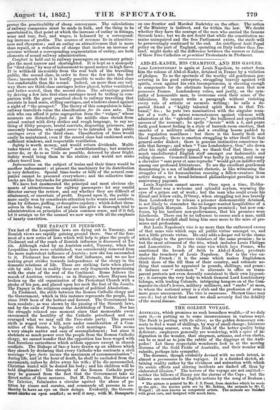THE PAPACY IN PIEDMONT.
THE last of the Leopoldine laws are dying out in Tuscany, and Romish views are rapidly gaining ground there. One of the fore- most of a new series of laws which will help to place the people of Piedmont out of the reach of Romish influence is discussed at Tu- rin. Although ruled by an Austrian cadet, Tuscany, when her Leopoldine laws were established, was considerably removed from the more malevolent influence of Austria ; now she has succumbed to it. Piedmont has thrown off that 'influence, and we see her making great strides towards independence of the clergy in the domestic relations of life. These are striking facts when placed side by side; but in reality these are only fragments harmonizing with the state of the rest of the Continent. Rome follows the march of Austrian victories ; as in Hungary, where Haynan has broken up the old organization of the Protestant Church with a stroke of his pen, and placed upon her neck the foot of the Jesuits. The Papacy is the religious complement of political Absolutism. THE last of the Leopoldine laws are dying out in Tuscany, and Romish views are rapidly gaining ground there. One of the fore- most of a new series of laws which will help to place the people of Piedmont out of the reach of Romish influence is discussed at Tu- rin. Although ruled by an Austrian cadet, Tuscany, when her Leopoldine laws were established, was considerably removed from the more malevolent influence of Austria ; now she has succumbed to it. Piedmont has thrown off that 'influence, and we see her making great strides towards independence of the clergy in the domestic relations of life. These are striking facts when placed side by side; but in reality these are only fragments harmonizing with the state of the rest of the Continent. Rome follows the march of Austrian victories ; as in Hungary, where Haynan has broken up the old organization of the Protestant Church with a stroke of his pen, and placed upon her neck the foot of the Jesuits. The Papacy is the religious complement of political Absolutism.
In Piedmont, the strife between the Roman Catholic clergy and the Government, which in this instance represents the people, has since 1848 been of the hottest and fiercest. The Government has been resolute ; as was shown by the passing of the Siccardi laws, and by the exile of Franzoni the Archbishop of Turin. Nor has the struggle relaxed one moment since that memorable event envenomed the hostility of the Catholic priesthood and en- couraged what we may call the Free-state party. The present strife is waged over a bill, now under consideration of a Com- mittee of the Senate, to legalize civil marriages. This seems a very simple matter and easy of accomplishment ; but since it abstracts so much power over the people from the Roman Catholic clergy, we cannot wonder that the opposition has been waged with that ferocious earnestness which seldom appears except in church conflicts. The Bishops of Savoy have drawn up an address which they clench by declaring that every Catholic who contracts a civil marriage "ipso facto incurs the maximum of excommunication" : during life, and at the hour of death, he shall be excluded from the sacraments, unless he drive away his wife ; if he die unreconciled, Christian burial will be denied his body ; and his children will be held illegitimate ! The strength of the Roman Catholic party may be guessed from the fact that the Government take no direct notice of these menaces. But M. Pernati, the Minister of the Interior, fulminates a circular against the abuse of pe- tition by vicars and curates, and commands all persons in au- thority to have an eye on their doings. Evidently, the Govern- ment shirks an open conflict; as well it may, with M. Bonaparte
on one frontier and Marshal Radetzky on the other. The action of the Ministry is indirect, and far within the law. We doubt whether they have the courage of the men who carried the famous Siccardi laws ; but we do not doubt that while the constitution re- mains unimpaired and the free Parliament exists, the strife will be perseveringly continued to the end. An intelligent Anti-Papal policy on the part of England, operating on Italy rather than Ire- land, might make all the difference between the success or failure of these Free Catholics or practical Protestants in Piedmont.


























 Previous page
Previous page